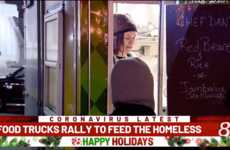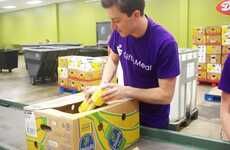
Farming Hope Offers Opportunity for the Homeless to Better Land Jobs
Justin Lam — May 1, 2018 — Social Good
References: farminghope.org & fastcompany
There may be no clear solution to solving homelessness, but startup nonprofit Farming Hope is making a true effort to help the homeless community in the Bay Area.With a mission statement centered around empowerment, dignity, service and food, this nonprofit aids the homeless through job training within the culinary industry. Born out of the Standford FEED Design School Incubator. Farming Hope has been working in the Bay Area since 2016 and aims to help individuals feel valued and share their gifts and talents with food.
At a recent pop-up in San Fransico's Civic Center neighborhood, Farming Hope offered up an eclectic menu prepared by a staff of homeless individuals. Menu items like seared mushroom red potato tostadas and roasted broccoli with honey siracha were served at the pop-up, with tickets costing $55 for the multi-course meal. The event also allowed homeless people to attend for free, while the entire service was also run by homeless individuals alongside culinary professionals.
Image Credit: Ash Ngu
At a recent pop-up in San Fransico's Civic Center neighborhood, Farming Hope offered up an eclectic menu prepared by a staff of homeless individuals. Menu items like seared mushroom red potato tostadas and roasted broccoli with honey siracha were served at the pop-up, with tickets costing $55 for the multi-course meal. The event also allowed homeless people to attend for free, while the entire service was also run by homeless individuals alongside culinary professionals.
Image Credit: Ash Ngu
Trend Themes
1. Empowerment Through Culinary Training - Disruptive innovation opportunity: Developing programs or platforms that provide culinary training and job opportunities for marginalized individuals.
2. Socially Conscious Dining - Disruptive innovation opportunity: Creating dining experiences that not only offer delicious food but also support social causes and empower underserved communities.
3. Partnerships Between Culinary Professionals and Marginalized Communities - Disruptive innovation opportunity: Encouraging collaborations between culinary professionals and marginalized communities to promote diversity and inclusivity within the culinary industry.
Industry Implications
1. Nonprofit and Social Services - Disruptive innovation opportunity: Leveraging technology and new business models to improve the impact and scalability of nonprofit organizations working towards empowering marginalized communities.
2. Culinary and Food Services - Disruptive innovation opportunity: Introducing innovative culinary training programs and platforms that address social issues and provide job opportunities for vulnerable populations.
3. Social Impact Investing - Disruptive innovation opportunity: Creating investment models that prioritize social impact and support initiatives like Farming Hope by providing funding and resources for similar ventures.
5
Score
Popularity
Activity
Freshness























